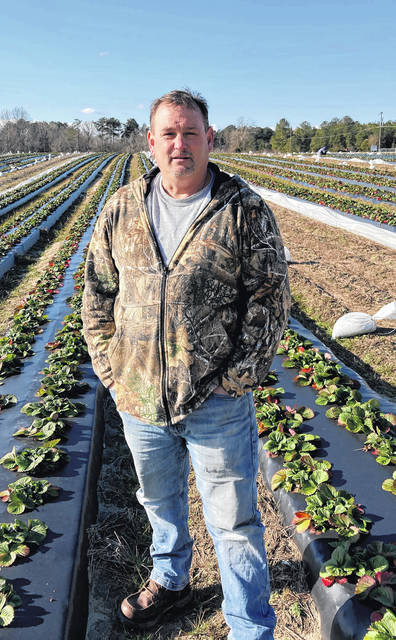Over the years, local farmer Lee Berry of Berry Patch fame attended many workshops on getting GAP certified. GAP, which stands for “Good Agricultural Practices,” is a voluntary set of procedures to protect consumers from food-borne illness by requiring certain production practices and product traceability. However, Berry never took the plunge to make it official. Recently he has found opportunities to sell the collards and sweet potatoes he grows for his produce stand to wholesale markets as well, such as the Sandhills AGInnovation Center (SAIC) in Ellerbe. Many wholesalers, including the SAIC, require farmers to be GAP certified.
Luckily, Lee does not have to go it alone. Chloe Johnson of the Carolina Farm Stewardship Association (CFSA) assists growers to get certified, including helping to write the Farm Food Safety Plan. She met with Mr. Berry last month to go over the practices he needs to follow in order to qualify. Most are common sense procedures that he is already doing, but some are less intuitive. For example, neither the collards nor the pack boxes may touch the ground in the field. Nor can Berry just lay down a tarp because the workers would have to walk on it, thereby introducing a potential source of contamination. He is envisioning each worker having his or her own cart in the field to meet this requirement.
Berry already follows the guidelines to store the boxes of produce on pallets that are either covered or indoors, at least 6 inches from any walls, and with mouse bait stations around the edges for pest control. For GAP, the pallets need to be made of non-porous plastic or metal, or wooden pallets covered with plastic sheeting, so they can be washed.
Preventing water contamination is a big part of GAP: both keeping storm runoff out of the fields and making sure the water used for irrigation and packing ice is from clean sources. With funding assistance from the State, Berry excavated ditches around his fields so that, barring a rare big storm event, no runoff enters his fields. Also, no septic fields are within 100 feet of his fields and no livestock are raised on the surrounding land. Berry tests the irrigation pond and all other irrigation water sources 3 times per year. The irrigation water standards are less strict than drinking water standards.
The grower also has to create and test a labeling system to enable traceability. In the unlikely case that produce is found later to be contaminated (i.e., makes someone sick), it must be traceable to the field, workers and date of harvest, to facilitate a recall. A mock recall tests the tracing system. In a mock recall, working with a wholesale buyer of the growers’ product, the buyer must be able to “trace”, or locate, the product that was purchased and provide the grower with the information on the label within four hours.
Berry says that the most challenging aspect of GAP is all the record keeping. Another is training the workers. The new plan to ensure that leafy greens will not contact the soil, for example, will be on the training agenda. The GAP auditor can ask a worker about any procedures related to food safety; for example, what practices would a worker follow if she accidentally cut her hand while harvesting in the field, to prevent blood from contacting harvested produce? In addition, workers must be provided a break station with a table, handwashing station, stainless-steel trash can with a lid, and signage in the porta john and at the handwashing station reminding workers to wash their hands. Berry already has these in place.
An inspector will audit Berry’s harvest every October to verify that his processes meet the GAP standards. One side benefit of GAP certification is that Berry may get inspected less often by Food Safety Modernization Act (FSMA) produce safety inspectors. Whereas GAP is voluntary and driven by buyers, FSMA is a federal law applying to produce growers who sell over $25,000 in produce per year. The FSMA inspectors realize that if a grower meets the GAP requirements, they are likely to meet the FSMA requirements as well. (For further comparison of GAP and FSMA, see How do GAP certifications compare to FSMA’s produce safety rule?)
When asked how he feels about GAP, Berry says, “I’m sure once I do it, it’ll be fine. It’s part of the future. If you want to do any kind of wholesale it will be a must. It’s an extra feather in my cap.” If you are a commercial horticulture grower and you would like to expand your market opportunities by getting GAP certified, the North Carolina Department of Agriculture and Consumer Services will cost-share the first-year audit and in alternating years after that, as funds are available, on a first-come, first-served basis.
You can start by checking out the Sandhills AgInnovation Center Wholesale Readiness Checklist. For further information, please contact the NC Cooperative Extension, Richmond County Center at 910-997-8255 or send an email to [email protected].
Nancy Power is the Commercial Horticulture Agent for the Richmond County Cooperative Extension.

